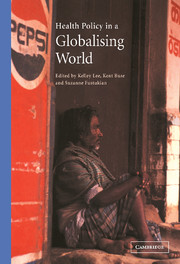Book contents
- Frontmatter
- Contents
- List of figures
- List of tables
- List of boxes
- Notes on contributors
- Foreword
- Preface
- Acknowledgements
- Abbreviations
- Part I
- Part II
- 9 Global rhetoric and individual realities: linking violence against women and reproductive health
- 10 The globalisation of DOTS: tuberculosis as a global emergency
- 11 Ageing and health policy: global perspectives
- 12 Workers' health and safety in a globalising world
- 13 Globalisation, conflict and the humanitarian response
- Part III
- References
- Index
- References
11 - Ageing and health policy: global perspectives
Published online by Cambridge University Press: 22 September 2009
- Frontmatter
- Contents
- List of figures
- List of tables
- List of boxes
- Notes on contributors
- Foreword
- Preface
- Acknowledgements
- Abbreviations
- Part I
- Part II
- 9 Global rhetoric and individual realities: linking violence against women and reproductive health
- 10 The globalisation of DOTS: tuberculosis as a global emergency
- 11 Ageing and health policy: global perspectives
- 12 Workers' health and safety in a globalising world
- 13 Globalisation, conflict and the humanitarian response
- Part III
- References
- Index
- References
Summary
Introduction
Accelerated population ageing is now a global trend: it is already a significant issue for developed countries and is becoming one in many poorer parts of the world. Different aspects of globalisation may have potential relevance for the health and well-being of older people. Globalisation has influenced the emergence of international policy debates about population ageing, particularly through the diffusion of a negative cultural paradigm of old age largely of western origin. Also, global orthodoxies of health care financing and management have become increasingly prominent, and many of them have important, and often detrimental, impacts on elders. This chapter examines these issues, paying particular attention to possible implications for health policy.
Definitions, meanings and trends
There is general dissatisfaction with defining old age in purely chronological terms, but there would appear to be no universally appropriate alternatives to this approach. Old age is perceived and understood in a multitude of different ways, often with important cultural variations. These may refer to biological processes and physical appearance, key life events or social roles (Knopoff et al. 1991; Derricourt and Miller 1992; Apt 1997). Since old age can cover a span of over three decades, most cultures distinguish between the ‘old old’ and ‘young old’, and it is usually more meaningful to think in terms of a gradual change, rather than a sharp cut-off between adulthood and later life.
- Type
- Chapter
- Information
- Health Policy in a Globalising World , pp. 195 - 207Publisher: Cambridge University PressPrint publication year: 2002



